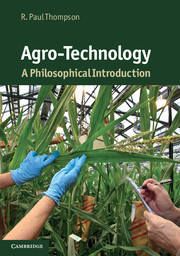Book contents
- Frontmatter
- Contents
- List of figures
- List of tables
- Preface
- Introduction
- 1 Scientific background
- 2 Application of genetics to agriculture
- 3 Philosophical and conceptual background
- 4 The controversy
- 5 The controversy
- 6 The controversy
- 7 The organic alternative
- 8 Impacts on low- and middle-income countries
- Concluding remarks
- Bibliography
- Index
8 - Impacts on low- and middle-income countries
Poverty, farming and colonial legacies
Published online by Cambridge University Press: 05 June 2012
- Frontmatter
- Contents
- List of figures
- List of tables
- Preface
- Introduction
- 1 Scientific background
- 2 Application of genetics to agriculture
- 3 Philosophical and conceptual background
- 4 The controversy
- 5 The controversy
- 6 The controversy
- 7 The organic alternative
- 8 Impacts on low- and middle-income countries
- Concluding remarks
- Bibliography
- Index
Summary
This chapter moves the focus away from rich countries to low- and middle-income countries, in particular low-income sub-Saharan African countries. Having been many times to rural areas of western Kenya, I have a personal interest in the GM debate in Africa and in the larger agricultural debates as they relate to farming and poverty in sub-Saharan African countries. I will advance the case that the principal harm arising from GM agriculture in African countries has been, in fact, the unconscionable way in which they have been denied the benefits of scientific and technological advances in agriculture. The same is frequently true of the benefits of science and technology in environmental remediation, in aquaculture and in medicine – especially pharmaceuticals and diagnostic technology such as antiretrovirals for treatment of HIV/AIDS. In the case of medicine, the rich-country outcry has been vociferous, and action to remedy the situation has been forthcoming. Not so with science and technology in agriculture.
In most low- and middle-income countries population growth has outstripped the means of subsistence, and individuals live in various states of poverty, starvation, inadequate nutrition and poor health; the Malthusian dynamic is real. There are no completely reliable data on world poverty. Perhaps the best data are found in the World Bank's 2005 World Development Indicators. Globally, in 2001, 2.7 billion people lived on less than US$2 per day. This means 50 per cent of those in low- and middle-income countries are very poor and, as a result, are usually malnourished. Recently, China and India have experienced declines in the proportion of very poor people. Tragically, sub-Saharan Africa has experienced an increase, and that in spite of the billions of dollars in aid that have been poured into African countries during the last decade. The challenge set by the United Nations Millennium Development Goals is to reduce by half the proportion of people who suffer from hunger, measured by malnutrition, by 2015. To achieve this goal means increasing the food resources consumed by 2 billion people, at a minimum. Although the Organisation for Economic Co-operation and Development (OECD) continues to forecast an increase in world agricultural output, the increases fall far short of what will be needed to halve the number of malnourished individuals by 2015. And, halving the number by 2015, although an ambitious goal, leaves half the problem to be solved after that date.
- Type
- Chapter
- Information
- Agro-TechnologyA Philosophical Introduction, pp. 199 - 213Publisher: Cambridge University PressPrint publication year: 2011

